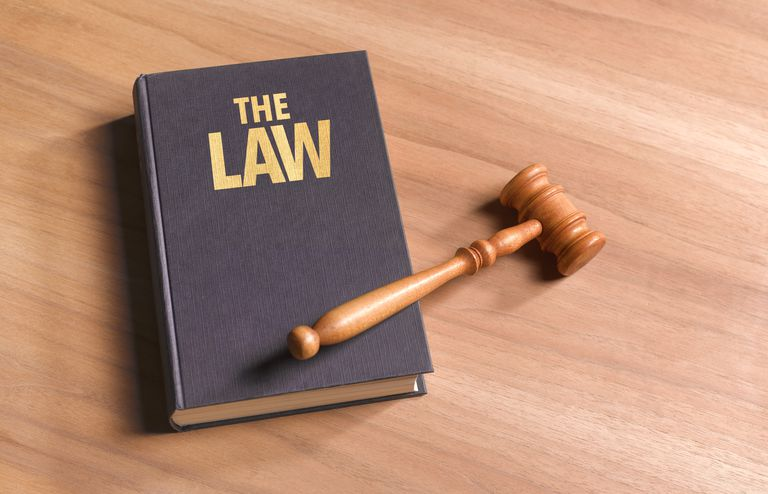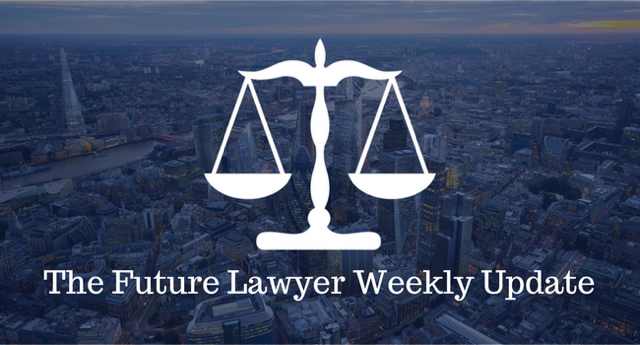
Long Live the Lockstep
October 21, 2019
What To Expect From Your First Year In Law School
October 23, 2019The round-up of the stories that a budding Student Lawyer should be aware of this week. Sign up here to get these updates in your inbox every week.
Employment Law: Extension of the meaning of workers
Supreme Court rules judges are to be classed as workers
Reported by Ellena Mottram
A landmark case in the Supreme Court has ensured that the standard employment protection for whistle-blowers has been extended to all judges.
Claire Gilham had a breakdown and was sent death threats after highlighting the issues created by the impact of cuts to legal aid. District Judge Gilham originally wanted to make a whistleblowing claim against the Ministry of Justice after her treatment following her decision to raise concerns in the court administration. Specifically, she raised issues with poor working conditions and excessive workloads facing judges.
However, because judges are officeholders rather than employees, Judge Gilham was not automatically entitled to the safeguards granted to whistleblowers under the Employment Rights Act.
Sections 43A to 43L of the Employment Rights Act 1996 ensures workers are protected from being subject to any detrimental treatment because the individual has made a protected disclosure. However, in 2017 the Court of Appeal ruled that whistleblowing protection could not be extended to her because she could not be classed as a worker.
The Supreme Court has however ruled that District Judge Claire Gilham could be classed as a worker. As a result, she would be entitled to the same whistleblowing protection. In doing so the judges unanimously ruled contrary to the Court of Appeal ruling in 2017 which held she could not be classed as a worker.
In delivering the judgment, Lady Hale highlighted that subjecting a whistle-blower to detriments such as bullying interferes with their right to freedom of expression, protected by Article 10 of the European Convention of Human Rights and denying her those remedies would amount to discrimination against her.
Speaking after the judgment was given, Lady Hale highlighted that judges are just as in need of protection when whistleblowing as the point of whistleblowing is to give confidence to individuals that it is safe to raise malpractice within any organisation.
District Judge Gilham, who still sits as a district judge in Manchester, highlighted that extending the protection offered to whistleblowers to judges would only enhance the independence of the judiciary which is a valuable constitutional safeguard which is good for justice.
This ruling extends the whistle-blowing protection for judges, but the solicitor acting on behalf of Judge Gilham highlighted the ruling would also have an impact on others who are classed as officeholders. This category extends to the clergy, trustees and many company directors and secretaries.
The ruling by the Supreme Court means her case can return to an employment tribunal where the merits of her claim will be considered. Originally, the Ministry of Justice argued an employment tribunal did not have jurisdiction to consider the merits of her claim because she could not be classed as a worker within the meaning of the Employment Rights Act.
Law
Sky v Skykick: trademark law
Reported by Laurence Tsai
One of the most interesting trademark disputes in recent years is the dispute between television broadcaster Sky against Skykick, a start-up supplying cloud migration IT services. The UK High Court referred a matter to the CJEU regarding the dispute as Sky sued Skykick for having allegedly infringed its various “Sky” trademarks. Skykick brought a counterclaim and alleged that Sky’s trademarks were invalidly registered on two grounds that:
- (i) the specifications of goods and services lack clarity and precision
- (ii) the relevant trademark applications were consequently made in bad faith.
Last week, EU Advocate General (AG) Evengi Tanchev issued his opinion concerning the notion of clarity and precision in trade mark specifications and whether a finding that a specification is lacking in the same can amount to a subsequent finding of bad faith. With regards to the concept of clarity and precision, the AG determined that while the lack of clarity and precision in a trademark specification could not be considered as an additional ground of invalidity, the importance of clarity and precision in trademark law should be left to the respective intellectual property offices at national level. Nonetheless, the AG stated that the term “computer software” was too broad and variable a term to be included in a trademark specification and still be compatible with the trademark acting as an indicator of origin. To that end, he concluded that such terms are insufficiently clear and precise in order to determine the extent of protection conferred.
With regards to the second ground of Skykick’s counterclaim, the AG made commentary that in certain circumstances, if a party seeks to register a trademark without any intention to use it for the specified goods and services, this might constitute an element of bad faith, particularly if an applicant improperly seeks a monopoly to exclude potential competitors from using the trademarks in question, which he says could amount to an abuse of the trademark system.
While opinions are not binding, they are frequently adopted by the CJEU and, therefore, the impact on the current trademark law could have widespread effects. For example, if the CJEU follows the AG’s opinion, trademark owners with an established sign could potentially face challenges or allegations of bad faith against them for lack of intention to use the trademark. Moreover, various intellectual property offices may also be required to tighten its practice on what terms are considered too imprecise with regards to specified goods and services. As a result, companies would need to seek independent legal advice to review their brand portfolios and review strategies for protection and make any necessary adjustments. Applicants wishing to register a trademark for specific goods and services may also be required to consider terms that are not of a large scope, such as “consulting services”.
It will certainly be interesting to see the CJEU’s judgment in the case concerned as this may potentially set a new course for trademark law with various guidelines to assist the UK High Court. Although the AG’s opinions are not binding, they play a significant role in assisting the CJEU with determining its judgments, so one cannot rule out the possibility of this case concluding a watershed change in the landscape of the trademark system.
Law: Counter-Terrorism
Clarification about the 2019 counter-terrorism law
Reported by Emma Ducroix
In 2019, The Counter-Terrorism and Border Security Act was passed.
This act consists of increasing maximum prison sentences for terrorism offenses.
The body responsible for this Act published guidelines for judges and has circulated a fresh consultation on raising sentences for the most serious offences.
Mr Justice Julian Goose, a member of the Sentencing Council, said: “Terrorism offenses are extremely serious and can cover a wide range of factual circumstances, making them difficult and sensitive offenses to sentence. For this reason, the council is keen to ensure that the guidelines are kept up to date and fit for purpose.
Tougher punishments for those convicted of expressing support for banned organisations or viewing terrorist material online are being proposed by the Sentencing Council.
The act increased the maximum prison sentences for a range of terrorism offenses. And it will probably raise the sentence levels for the most serious examples of offending.
The council has in the past supported more punitive prison terms for terrorism in an era when “a terrorist act can be planned in a very short time, using readily available items as weapons, combined with online extremist material on websites which normalise terrorist activity”.
The most important changes concerning this up-to-date Act concern a distinction between an offender in a position of authority or influence who directly invites support for a proscribed organisation and one who expresses supportive views while being reckless as to whether others are encouraged to get involved.
For those who intentionally express support for a proscribed organisation while holding a position of trust the starting point for judges imposing a prison sentence should be seven years, the new guidelines recommend.
The culpability factors for those found guilty of collecting terrorist information have been amended to include offenses committed by viewing or streaming terrorist information over the internet.
For an offender who collects, makes a record of, possesses or views material that provides instruction for specific terrorist activity endangering life where harm is very likely to be caused, the judges’ starting point for sentencing those found guilty should be 10 years in custody, the guidelines propose.
The consultation runs from 22 October to 3 December. If confirmed, the revised guidelines will apply to offenders aged 18 years and above and will come into effect in early 2020.
You can find out more here.
Brexit
Liberty fails to challenge Boris’s no-deal Brexit
Reported by Jutha Cheewat
After Boris Johnson pleaded to deliver a no-deal Brexit, Liberty, the human rights organisation, applied for an urgent application seeking to prevent Boris to leave the EU with no deal.
Last Friday, the court of appeal in London unanimously rejected the urgent application put forward. The senior judges sat, including the lord chief justice, Lord Burnett of Maldon, Sir Terence Etherton, and Dame Victoria Sharp agreed that there was no need for the court to consider the issue at present.
However, Hermer QC, who represented Liberty on the case stated that any delay might allow the PM to leave with no deal if Parliament rejects the current proposal. He said the court had a “constitutional duty to be seized of the matter”.
Sir James Eadie QC, who represented the PM, suggested that such application was made too early considering the current situation. According to the Guardian, he stated that “It would be inappropriate for the court to interfere in the process. Everyone on the government’s side has been dedicating their efforts to get to a position of a deal.” Besides, he suggested that it would be “unnecessary for the court to engage in this exercise” if Parliament agrees to the deal later down the line.
Nevertheless, Martha Spurrier, Liberty’s director, insists firmly that their fight will continue as she said: “Our democracy is at stake.” Interestingly, Spurrier also added that “This case has nothing to do with Brexit. It is about ensuring the government – whoever it is, or whatever its intention – obeys the law.” She emphasised the need to ensure that the Rule of Law is upheld and the importance of accountability.
Moreover, the Scottish’s highest court had also rejected a similar legal bid that the anti- Brexit campaigner put forward. The legal issue focused on the effect of the potential withdrawal agreement that may prevent Northern Ireland from forming part of a separate customs territory, in breach of section 55 of the Taxation (Cross-border Trade) Act 2018. In short, the court in Edinburgh decided that such matter should be left “to parliament to proceed … in the manner and according to the procedures that parliament considers most appropriate.”
Maugham QC, the director of the Good Law Project, tweeted about the matter. He emphasised the fact that the PM’s short-term political goal should not trump proper scrutiny when the whole country is at risk. However, earlier this month, Boris did reassure moderate Tories that he will not fight his future election with a no-deal manifesto.



